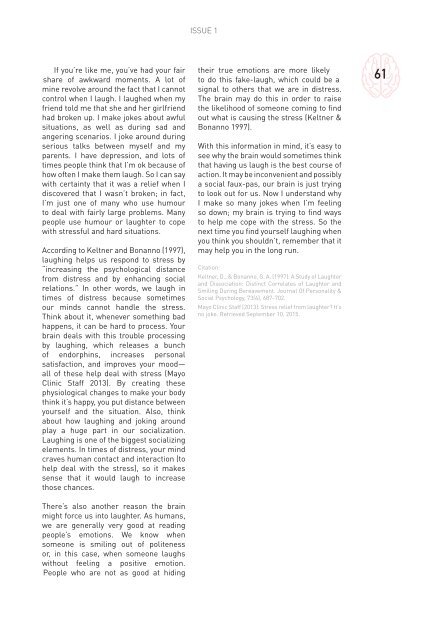PSYCH2GO-HQ-Pages
You also want an ePaper? Increase the reach of your titles
YUMPU automatically turns print PDFs into web optimized ePapers that Google loves.
ISSUE 1<br />
If you’re like me, you’ve had your fair<br />
share of awkward moments. A lot of<br />
mine revolve around the fact that I cannot<br />
control when I laugh. I laughed when my<br />
friend told me that she and her girlfriend<br />
had broken up. I make jokes about awful<br />
situations, as well as during sad and<br />
angering scenarios. I joke around during<br />
serious talks between myself and my<br />
parents. I have depression, and lots of<br />
times people think that I’m ok because of<br />
how often I make them laugh. So I can say<br />
with certainty that it was a relief when I<br />
discovered that I wasn’t broken; in fact,<br />
I’m just one of many who use humour<br />
to deal with fairly large problems. Many<br />
people use humour or laughter to cope<br />
with stressful and hard situations.<br />
According to Keltner and Bonanno (1997),<br />
laughing helps us respond to stress by<br />
“increasing the psychological distance<br />
from distress and by enhancing social<br />
relations.” In other words, we laugh in<br />
times of distress because sometimes<br />
our minds cannot handle the stress.<br />
Think about it, whenever something bad<br />
happens, it can be hard to process. Your<br />
brain deals with this trouble processing<br />
by laughing, which releases a bunch<br />
of endorphins, increases personal<br />
satisfaction, and improves your mood—<br />
all of these help deal with stress (Mayo<br />
Clinic Staff 2013). By creating these<br />
physiological changes to make your body<br />
think it’s happy, you put distance between<br />
yourself and the situation. Also, think<br />
about how laughing and joking around<br />
play a huge part in our socialization.<br />
Laughing is one of the biggest socializing<br />
elements. In times of distress, your mind<br />
craves human contact and interaction (to<br />
help deal with the stress), so it makes<br />
sense that it would laugh to increase<br />
those chances.<br />
There’s also another reason the brain<br />
might force us into laughter. As humans,<br />
we are generally very good at reading<br />
people’s emotions. We know when<br />
someone is smiling out of politeness<br />
or, in this case, when someone laughs<br />
without feeling a positive emotion.<br />
People who are not as good at hiding<br />
their true emotions are more likely<br />
to do this fake-laugh, which could be a<br />
signal to others that we are in distress.<br />
The brain may do this in order to raise<br />
the likelihood of someone coming to find<br />
out what is causing the stress (Keltner &<br />
Bonanno 1997).<br />
With this information in mind, it’s easy to<br />
see why the brain would sometimes think<br />
that having us laugh is the best course of<br />
action. It may be inconvenient and possibly<br />
a social faux-pas, our brain is just trying<br />
to look out for us. Now I understand why<br />
I make so many jokes when I’m feeling<br />
so down; my brain is trying to find ways<br />
to help me cope with the stress. So the<br />
next time you find yourself laughing when<br />
you think you shouldn’t, remember that it<br />
may help you in the long run.<br />
Citation:<br />
Keltner, D., & Bonanno, G. A. (1997). A Study of Laughter<br />
and Dissociation: Distinct Correlates of Laughter and<br />
Smiling During Bereavement. Journal Of Personality &<br />
Social Psychology, 73(4), 687-702.<br />
Mayo Clinic Staff (2013). Stress relief from laughter? It’s<br />
no joke. Retrieved September 10, 2015.<br />
61


